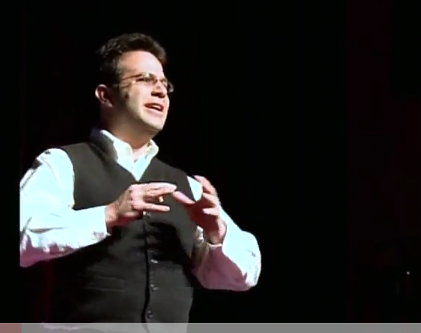
If you ask Chris Lehmann how he became the principal of the Science Leadership Academy, he’ll just laugh.
“That’s a loooong and complicated story,” he says.
The Philly-native has been the only principal in the SLA’s four-year history and has been an unabashed cheerleader for innovation in our nation’s education system, speaking at TEDxNYED, Ignite Philly and, most recently, the Supernova Hub conference last month about the subject.
The Science Leadership Academy, located near Logan Square, is a partnership between The Franklin Institute and the School District of Philadelphia that focuses primarily on science and technology. At SLA, every student receives a laptop and the school encourages “inquiry-based learning” that eschews tests for projects and collaboration.
When we caught up with Lehmann he was busy preparing for the upcoming school year and anxious to see how the first graduating class of the SLA fared in its first college semester. Below we ask him what’s the one word he reads everyday for inspiration and why innovating at a school is harder than at a startup.
As always, this interview has been edited for length and clarity
There’s always new stuff. For us, we’re hoping to roll out a new school portal that is being build on conduction with Devnuts. The other big innovation is taking advantage of Google Apps. We’re going to try and be on the cutting egde of that.
How is innovating at a school different than the public or private sector? Is it difficult to innovate in such an entrenched industry while dealing with the Philadelphia School District?
It’s more of a question about how to innovate well. It’s not the bureaucracy that holds us back, it’s the thought of “How do you do this wisely while still taking care of your kids?”
The difference between innovation in business and a school is that, at the end of the day, people expect startups to fail. But in schools you don’t have that luxury. If you fail a kid or don’t do right by a student because you were busy trying to be innovative, you’ve done damage.
People leap to the bureaucracy as a reason that schools don’t innovate. It’s really about the high stakes. This isn’t about economics, it’s about peoples lives. Kids get one chance to be in third grade. They get one chance to be in high school.
How do you balance those stakes with what you’re doing?
It’s about how you plan and how you do it thoughtfully. We always ask ourselves “What’s the worst consequence of our best idea?” You try and not fall in love with technology for technology’s sake. You remember you are doing these things for a reason.
Have SLA’s practices rippled though the city’s education system? Or the education community in general?
What we’re going to see in the next couple of years is how our kids do in college, and that’s where the proof really is.
Can the technology community help you at all? I know you host Startup Corps, is there any other way our readers can help?
We’re always looking for mentors, we’re always looking for people want to come in and spend time with the kids and we’re always looking for new ideas. There’s lots of ways
If someone is reading this and thinks, “I want to help” where should TP send them?
Shoot me an email.
What do you read to keep track of innovation in education? What blogs and sites do you read?
I follow a gazillion blogs. I follow anything that can be applied to education. I read Seth Godin, I follow the TED talks, Gaping Void is always a playful thought-provoker. I pick up Fast Company from time to time.
The other thing I really try to do is I read a lot of progressional education theory thats been around for a long time. I try to marry the ideas that have come before us with the new tools and ideas we have today. The biggest mistake we can make, not just in education but in general, is forgetting we stand on the shoulders of giants.
So what Gaping Void cartoon do you have hung up in your office?
I don’t, actually. The big thing I have hung up in my office is a Post-it note over my desk that says the word “think.”
See Lehmann’s Ignite Philly talk, viewed over 12,000 times
http://www.viddler.com/player/37f27c4/
Every Friday, Technically Philly brings you an interview with a leader or innovator in Philadelphia s technology community. See others here.
Before you go...
Please consider supporting Technical.ly to keep our independent journalism strong. Unlike most business-focused media outlets, we don’t have a paywall. Instead, we count on your personal and organizational support.
3 ways to support our work:- Contribute to the Journalism Fund. Charitable giving ensures our information remains free and accessible for residents to discover workforce programs and entrepreneurship pathways. This includes philanthropic grants and individual tax-deductible donations from readers like you.
- Use our Preferred Partners. Our directory of vetted providers offers high-quality recommendations for services our readers need, and each referral supports our journalism.
- Use our services. If you need entrepreneurs and tech leaders to buy your services, are seeking technologists to hire or want more professionals to know about your ecosystem, Technical.ly has the biggest and most engaged audience in the mid-Atlantic. We help companies tell their stories and answer big questions to meet and serve our community.
Join our growing Slack community
Join 5,000 tech professionals and entrepreneurs in our community Slack today!






